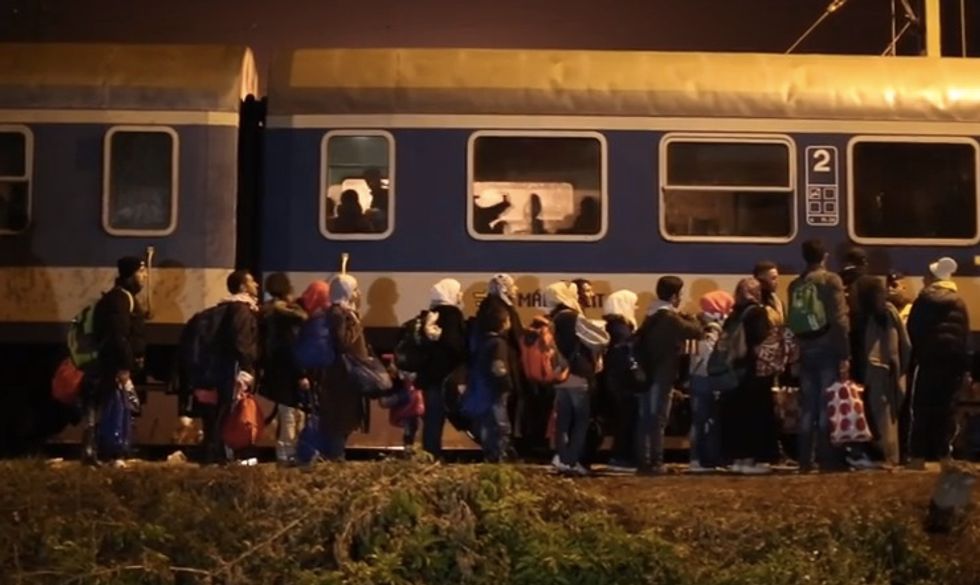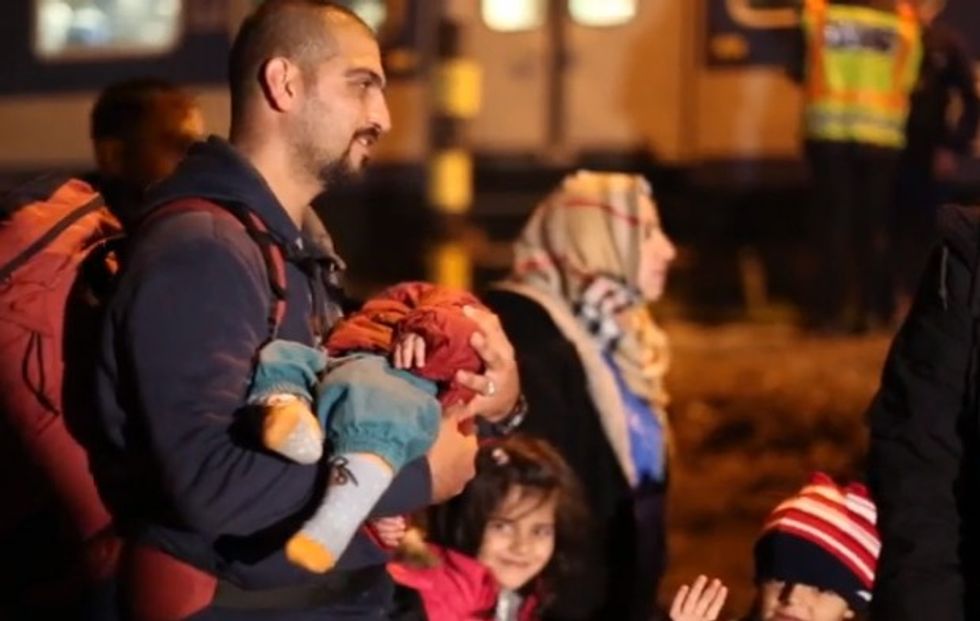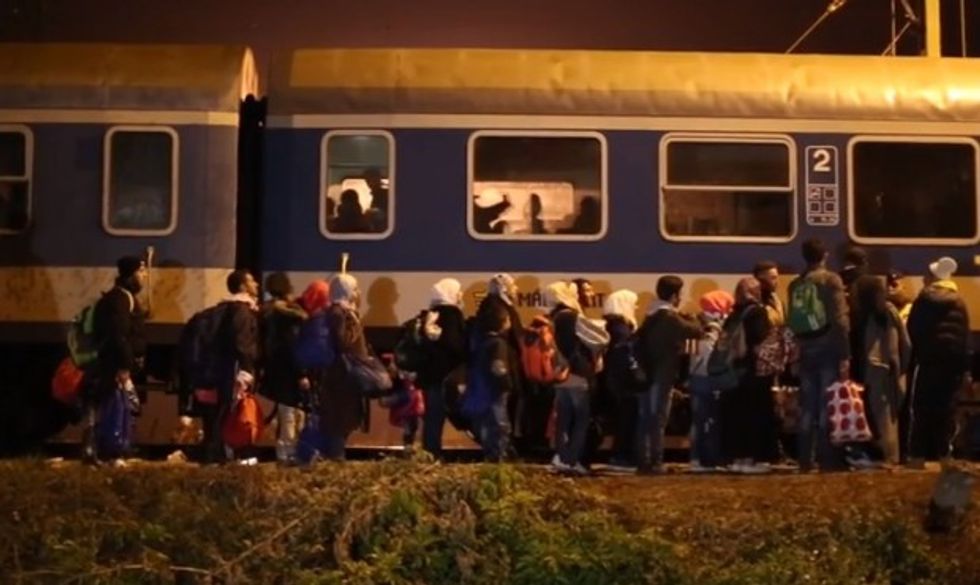
Families boarding a train (Operation Blessing)

It was a tragic scene: A beleaguered father carried his infant child as his wife and kids walked beside him, trudging step by step toward a train that would carry them even closer to the freedom that they had been so desperately seeking.
Displaced from their homes in Syria, this was just one of the many families that Bill Horan, president of Operation Blessing International, a Christian relief organization based in Virginia Beach, Virginia, recently observed during a visit to the border of Croatia and Hungary.
A diverse mixture of Muslims, Christians and others, Horan saw a massive group that was united by one common thread: a violent and contentious situation in their home country that forced them to leave behind everything that they had ever known.

"There was a certain spirit ... you'd look at a little kid and they'd smile at you," he said of the Middle Eastern refugees. "They weren't totally beat down, but they were extremely fatigued."
Horan estimated that there were about 1,500 refugees who arrived at the border when he visited one night earlier this month. From there, they would transfer trains and continue on their journey toward Germany, in search of safety, freedom and a better life.
"To me, the refugees were faceless," Horan said of his reason for visiting the region. "I wanted to put faces on the faceless."
The humanitarian leader is no stranger to pain and suffering, as Operation Blessing has served individuals and communities in distress across the globe. But he said that this scene was among the most emotional that he had ever experienced.
"It was such an intense activity [on the border in Croatia] that we didn't have a chance to really interact with any of them," he said. "It was one of the most profoundly sad things I've ever seen in my life — and I've seen a lot of sad things."
Watch video of Horan's border experience below:
Horan described arriving in the afternoon one day after having just missed a train with between 1,200-1,400 refugees aboard. Hoping to see first-hand what these individuals were facing, he was told that another train would arrive at 9:30 p.m., so he and his team decided to wait.
That night, he watched through the pitch dark as men, woman and children disembarked the train and headed toward another locomotive over the border in Hungary; refugee trains have not been permitted to cross between the two countries.
"What we witnessed was this massive group of people — somewhere around 1,500 — they were all on a train," Horan recalled. "The train comes up the tracks to about a half-mile of the Hungary border."
By that point in their harrowing journey toward freedom, he said that many of the refugees had already crossed six or seven borders. Most of the border between the two countries was already shut down, but a small area still remained open and the refugees were lined up and soldiers shuffled them through in a remarkably ordered fashion, Horan said.

"It was cold, raining and very dark, and we were able to get within 20 feet of the opening of the fence," he explained, citing his surprise over such close access, considering that they did not have permission to be at the border. "We were right there watching and filming as the long parade of refugees streamed through the fence."
The men, women and children seeking reprieve walked through what he described as a "human gauntlet," as solders stood about 20 feet apart, allowing refugees to walk in line through the border before 120-130 of them were "herded" onto each cart.
Their final destination: Munich.
Once the train was filled, Horan said that he observed another sobering scene; the train backed up about a quarter of a mile into a lighted area, where church groups and organizations had spent hours assembling food and packages for the refugees.
Individuals and families reached out of the train windows to grab care bags, complete with bread, apples, cheese and other sustenance.
As the train drove off into the darkness, Horan said that he heard an official proclaim that yet another train filled with refugees would be arriving to the same location around 3:30 a.m. — a revelation that Horan found horribly tragic.
"This endless parade of suffering. It was a very sad moment," he said. "Fortunately, at least for the folks that I saw they were being treated well."
Horan said that he was already well aware of the controversy surrounding fears that extremists would take advantage of the refugee crisis to permeate the borders of European countries. But while he admitted to initially sharing similar fears about the number of men among the refugee population, he said that an interview with a 27-year-old Syrian whom he met during a separate trip to Munich changed all that.
The man, a computer science major who said he was looking to start a better life, explained why he had, himself, become a refugee.

"I'm from a large family and most Syrian families are large, and we had a family meeting and everyone was there," the man told Horan. "And the family elders chose the person most likely to make it all the way to Germany to get there safely find out what's going on, get established, and begin sending information and money to those members of the family who couldn't travel."
It was a conversation that Horan said changed his perspective on why many men might be fleeing, though he said that he's "sure there's bad guys mixed in."
The refugees who end up in Munich — where officials have been completely overwhelmed — end up living in centers, including buildings, dorms and other similar makeshift residences.
Not everyone is so lucky, though, as some refugees are outdoors during a time when temperatures are plummeting and the conditions are less than ideal for outdoor bunking.
"It's going to be a miserable, long winter," Horan said.
The border between Croatia and Hungary was sealed off last week just a few days after Horan's visit. Find out more about Operation Blessing here.
Billy Hallowell